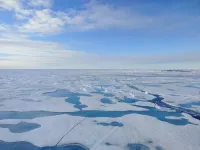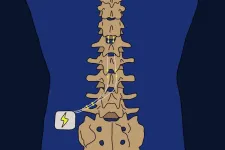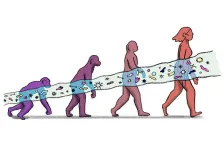(Press-News.org) The first summer on record that melts practically all of the Arctic’s sea ice, an ominous milestone for the planet, could occur as early as 2027.
For the first time, an international research team, including University of Colorado Boulder climatologist Alexandra Jahn and Céline Heuzé from the University of Gothenburg in Sweden, used computer models to predict when the first ice-free day could occur in the northernmost ocean. An ice-free Arctic could significantly impact the ecosystem and Earth’s climate by changing weather patterns.
“The first ice-free day in the Arctic won’t change things dramatically,” said Jahn, associate professor in the Department of Atmospheric and Oceanic Sciences and fellow at CU Boulder’s Institute of Arctic and Alpine Research. “But it will show that we've fundamentally altered one of the defining characteristics of the natural environment in the Arctic Ocean, which is that it is covered by sea ice and snow year-round, through greenhouse gas emissions.”
The findings were published Dec. 3 in the journal Nature Communications. Jahn will also present the results in Dec. 9 at the American Geophysical Union annual meeting in Washington D.C.
A Blue Arctic
As the climate warms from increasing greenhouse gas emissions, sea ice in the Arctic has disappeared at an unprecedented speed of more than 12% each decade.
In September, the National Snow and Ice Data Center reported that this year’s Arctic sea ice minimum—the day with the least amount of frozen seawater in the Arctic—was one of the lowest on record since 1978.
At 1.65 million square miles, or 4.28 million square kilometers, this year’s minimum was above the all-time low observed in September 2012. But it still represents a stark decline compared to the average coverage of 6.85 million square kilometers between 1979 and 1992.
When the Arctic Ocean has less than 1 million square kilometers of ice, scientists say the Arctic is ice free.
Previous projections of Arctic sea ice change have focused on predicting when the ocean will become ice free for a full month. Jahn’s prior research suggested that the first ice-free month would occur almost inevitably and might happen by the 2030s.
As the tipping point approaches, Jahn wondered when the first summer day that melts virtually all of the Arctic sea ice will occur.
“Because the first ice-free day is likely to happen earlier than the first ice-free month, we want to be prepared. It’s also important to know what events could lead to the melting of all sea ice in the Arctic Ocean,” Heuzé said.
Non-zero possibility
Jahn and Heuzé projected/estimated the first ice-free Arctic day using output from over 300 computer simulations. They found that most models predicted that the first ice-free day could happen within nine to 20 years after 2023 regardless of how humans alter their greenhouse gas emissions. The earliest ice-free day in the Arctic Ocean could occur within three years.
It’s an extreme scenario but a possibility based on the models. In total, nine simulations suggested that an ice-free day could occur in three to six years.
The researchers found that a series of extreme weather events could melt two million square kilometers or more of sea ice in a short period of time: A unusually warm fall first weakens the sea ice, followed by a warm Arctic winter and spring that prevents sea ice from forming. When the Arctic experiences such extreme warming for three or more years in a row, the first ice-free day could happen in late summer.
Those kinds of warm years have already happened. For example, in March 2022, areas of the Arctic were 50°F warmer than average, and areas around the North Pole were nearly melting. With climate change, the frequency and intensity of these weather events will only increase, according to Heuzé.
Sea ice protects the Arctic from warming by reflecting incoming sunlight back into space. With less reflective ice, darker ocean waters will absorb more heat from the Sun, further increasing temperatures in the Arctic and globally. In addition, warming in the Arctic could change wind and ocean current patterns, leading to more extreme weather events around the world.
But there’s also good news: A drastic cut in emissions could delay the timeline for an ice-free Arctic and reduce the time the ocean stays ice-free, according to the study.
“Any reductions in emissions would help preserve sea ice,” Jahn said.
END
Countdown to an ice-free Arctic: New research warns of accelerated timelines
2024-12-03
ELSE PRESS RELEASES FROM THIS DATE:
Survey reveals grim state of Uganda’s lions, leopards, and hyenas
2024-12-03
Lion numbers in the country are at a critical low while hyenas are faring well across four major protected areas in Uganda, according to new survey findings co-led by Griffith University, Southern University of Science and Technology (China) and Northern Arizona University.
Researchers unveiled the first comprehensive population estimate of Uganda’s lions, leopards, and spotted hyenas in nearly two decades.
Conducted across six major protected areas – including the 4000 km2 Murchison Falls and the 2400 km2 Queen Elizabeth Conservation Area – this innovative study was a collaborative ...
The genetic roots of rare mutations in Alzheimer’s disease
2024-12-03
Leuven, 3 December 2024 – Alzheimer’s disease is a debilitating condition that slowly robs people of their memory and cognitive abilities, affecting millions of people worldwide. Familial Alzheimer’s disease (FAD), a rare inherited form of the disease, is linked to mutations in several genes, including APP, PSEN1, and PSEN2. The impact of PSEN2 mutations has remained less understood—until now. A research team led by Prof. Wim Annaert at VIB-KU Leuven has shed light on how mutated PSEN2 accelerates disease ...
Brain scan predicts effectiveness of spinal cord surgery
2024-12-03
A 10-minute brain scan can predict the effectiveness of a risky spinal surgery to alleviate intractable pain. The Kobe University result gives doctors a much-needed biomarker to discuss with patients considering spinal cord stimulation.
For patients with chronic pain that cannot be cured in any other way, a surgical procedure called “spinal cord stimulation” is seen as a method of last resort. The treatment works by implanting leads into the spine of patients and electrically stimulating the spinal cord. Because the spinal cord transmits sensations to the brain from all over the body, the position ...
Cognitive ability and physical health predict dementia later in life
2024-12-03
The risk of developing dementia later in life is strongly predicted by a person’s cognitive ability, functional limitations and physical health as many as 20 years before onset of the illness, according to a new RAND report.
Related new research found that early detection of cognitive impairment helps people to take mitigating actions to prepare for future loss of financial and physical independence.
While older adults’ take-up of cognitive testing currently is low, additional research found that use of cognitive tests would increase if it was free and readily accessible, ...
New survey finds 56% say ‘alone time’ is vital to their mental health
2024-12-03
COLUMBUS, Ohio – Some say the holidays are the most wonderful time of the year. But for others, the hectic holiday season may be the most stressful.
A new national survey of 1,000 Americans commissioned by The Ohio State University Wexner Medical Center and College of Medicine shows that 46% of Americans say they don’t get the alone time they need during the holidays.
In addition, 56% of survey respondents say that it’s very important to their mental health to have adequate alone time.
Sophie Lazarus, PhD, a clinical psychologist in the Department of Psychiatry and Behavioral Health at Ohio State, says in ...
How did human brains get so big? The answer could be in our gut
2024-12-03
How did human brains get so big? The answer could be in our gut
Microbes supporting the production of more metabolic energy could be key to the evolution of large brains
First study to show gut microbes from different animal species shape variations in their biology
Offers new take on human evolution, particularly the evolution of our large brains
Mice with large-brain primate microbes eat more, but grew slower and put on less body fat
Their bodies use the excess energy to produce high levels of glucose, which is the brain’s primary ...
Evaluation of the phytochemical and medicinal value of lemongrass (Cymbopogon citratus), by conversion into powders and extracts to develop a nutritional bakery product
2024-12-03
Background and objectives
Because of its extraordinary phytomedicinal potential and numerous potential health benefits, lemongrass (Cymbopogon citratus), a well-known medicinal and aromatic plant, is of paramount significance. It is typically used as a drug replacement.
Methods
The present study was comprised of drying lemongrass into powder and determining the proximate and mineral composition, and then developing ethanolic extracts of powder to determine total phenolic contents (TPC), total flavonoid contents (TFC), total carotenoids (TC), and DPPH free radical scavenging activity. Next, lemongrass powder (LGP) was replaced at 0, 2.5, 5, 7.5, and 10% levels ...
Monell Chemical Senses Center and A*STAR Singapore Institute of Food and Biotechnology Innovation sign agreement to collaborate in sensory science research and education
2024-12-03
PHILADELPHIA, PA and QUEENSTOWN, SINGAPORE (Monday, Dec 2, 2024 9:30 pm EST; Tuesday, Dec 3, 2024 9:30 am SST) The Monell Chemical Senses Center, a global leader in advancing the scientific understanding of taste, smell, and related senses, and A*STAR Singapore Institute of Food and Biotechnology Innovation (A*STAR SIFBI), a translational research institute for health and well-being focused on Asian phenotype have entered into a five-year research and education alliance.
Today, Benjamin P.C. Smith, PhD, Monell Executive Director & President, met with Sze Tan, PhD, A*STAR SIFBI Executive Director, to sign a Memorandum of Understanding ...
Five new papers highlight cancer inequities, challenges and opportunities in South Asia
2024-12-03
A series of five papers, published today in The Lancet Oncology by a University of Pittsburgh-led international team, highlights critical public health challenges related to cancer control in the eight countries that form the South Asian Association for Regional Cooperation (SAARC) and the Rohingya refugee population in Bangladesh. The series underscores barriers contributing to significant disparities in cancer outcomes and identifies actionable solutions to address these challenges in one of the most comprehensive ...
Stereotypes matter: Computer science needs better role models
2024-12-03
White, male, billionaire entrepreneurs fuel stereotypes that compound the issues surrounding diversity in technology and computer science, according to a new study.
The identities of famous people contribute a lot to stereotypes in their respective domains. Prominent public figures can easily become influential to young people. But are these role models effective for creating a diverse community of computer science students? That, at this point in time, seems unlikely.
The study, carried out by the University of Reading and published today ([INSERT DATE]) in the Oxford Review of Education, ...







